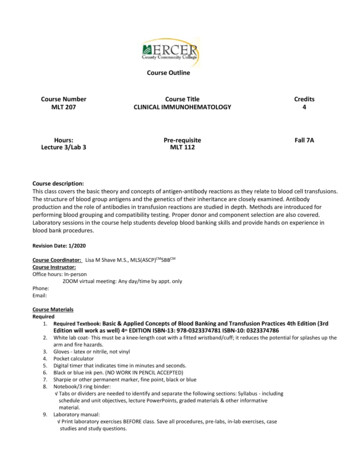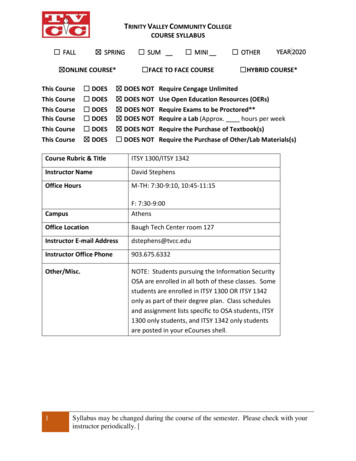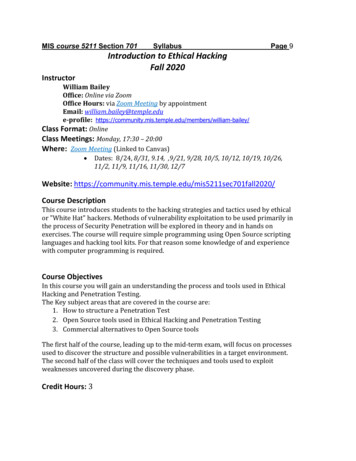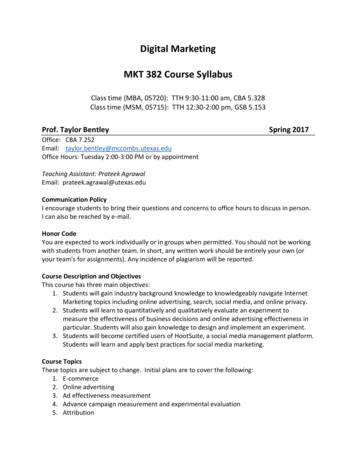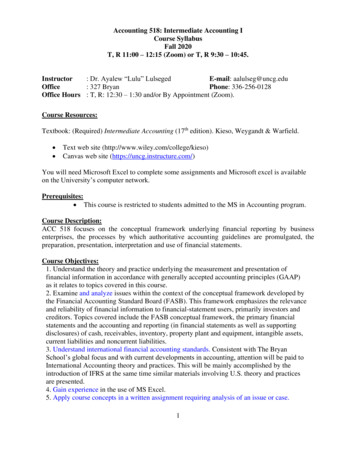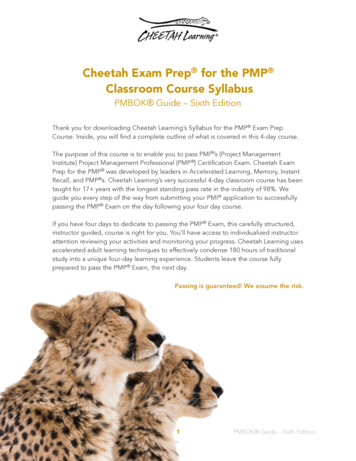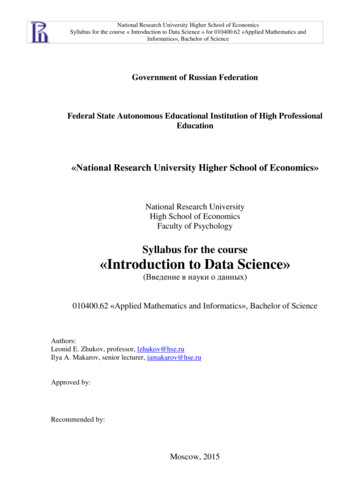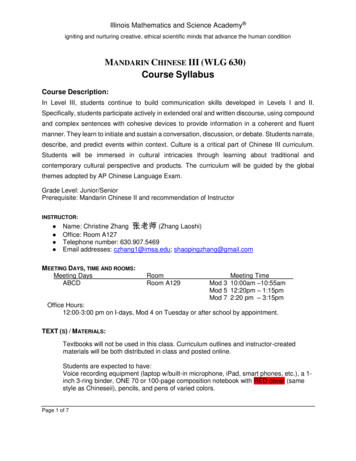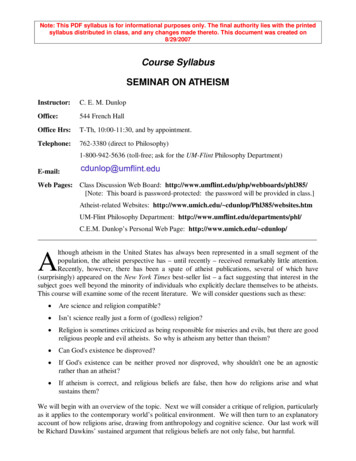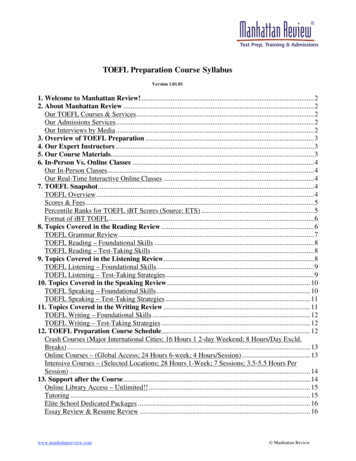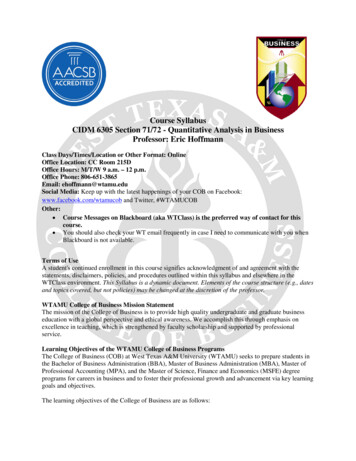
Transcription
Course SyllabusCIDM 6305 Section 71/72 - Quantitative Analysis in BusinessProfessor: Eric HoffmannClass Days/Times/Location or Other Format: OnlineOffice Location: CC Room 215DOffice Hours: M/T/W 9 a.m. – 12 p.m.Office Phone: 806-651-3865Email: ehoffmann@wtamu.eduSocial Media: Keep up with the latest happenings of your COB on Facebook:www.facebook.com/wtamucob and Twitter, #WTAMUCOBOther: Course Messages on Blackboard (aka WTClass) is the preferred way of contact for thiscourse. You should also check your WT email frequently in case I need to communicate with you whenBlackboard is not available.Terms of UseA student's continued enrollment in this course signifies acknowledgment of and agreement with thestatements, disclaimers, policies, and procedures outlined within this syllabus and elsewhere in theWTClass environment. This Syllabus is a dynamic document. Elements of the course structure (e.g., datesand topics covered, but not policies) may be changed at the discretion of the professor.WTAMU College of Business Mission StatementThe mission of the College of Business is to provide high quality undergraduate and graduate businesseducation with a global perspective and ethical awareness. We accomplish this through emphasis onexcellence in teaching, which is strengthened by faculty scholarship and supported by professionalservice.Learning Objectives of the WTAMU College of Business ProgramsThe College of Business (COB) at West Texas A&M University (WTAMU) seeks to prepare students inthe Bachelor of Business Administration (BBA), Master of Business Administration (MBA), Master ofProfessional Accounting (MPA), and the Master of Science, Finance and Economics (MSFE) degreeprograms for careers in business and to foster their professional growth and advancement via key learninggoals and objectives.The learning objectives of the College of Business are as follows:
2 LeadershipCommunicationCritical ThinkingBusiness IntegrationCore Business KnowledgeGlobal Business EnvironmentBusiness Ethics and Corporate GovernanceCourse DescriptionIn the 2009 New York Times article “For Today's Graduate, Just One Word: Statistics”, Google chiefeconomist Hal Varian remarks “I keep saying that the sexy job in the next 10 years will be statisticians.And I'm not kidding.” As the article points out, due to the massive amounts of data available in today'sworld, graduates with data analysis skills are high in demand in fields such as business, politics andmedicine.This course is an introduction to the application of quantitative tools to business decisions. We will covertopics such as statistics, linear programming and simulation. We will review and deepen yourunderstanding of key concepts in statistics and apply them to business data using Excel.Course ObjectivesBy the end of the course, students should be able to1. identify and use quantitative tools for business inference and forecasting, including regressionand correlation analysis, linear programming and simulation;2. identify and apply quantitative techniques for specific managerial applications;3. use spreadsheet software, in particular Microsoft Excel, to perform quantitative analysis;4. interpret quantitative reports and analyses;5. identify flaws in statistical reports and analyses;6. exhibit critical thinking skills.Course Materials (Text, calculator, etc.) Textbook (required): “Business Analytics: Data Analysis and Decision Making” (5th edition) byAlbright and Winston, Cengage Learning (ISBN-13 978-1133629603, ISBN-10 1133629601) Every new student edition of the text comes with access to the textbook companion website thatprovides access to the Excel files in the chapters and problems and the DecisionTools Suitesoftware.To access these resources, go to www.cengagebrain.com, search by ISBN 9781133629603, clickon the “Free Materials” tab and select “Access Now”. You will then be prompted to create anaccount. Access to Microsoft Excel (recent version)Map from COB Learning Objectives to Specific Course ObjectivesCOB Learning GoalCourse Learning GoalGoal 3: Critical Thinking1,2,4,5,6 via individual exams, group assignments 2015-2016 Double Click, Insert Professor Name All rights reserved.
3and discussion forumsGoal 4: Business Integration1,2,3,5 via individual exams and groupassignmentsCourse Grading Policies% of total gradeDateDiscussion board entries10%weeklyGroup Cases20%See weekly schedule for duedatesMidterm 120%Available Feb 17 – Feb 21(11:59 pm CT)Midterm 220%Available Mar 23 – Mar 27(11:59 pm CT)Final30%Available Apr 20 – Apr 24(11:59 pm CT)Discussion boardAt the beginning of every week, I will post a question for discussion in the “Weekly discussion” folder onBlackboard. The discussion will remain open all week and closes the following Sunday at midnight. Iexpect you to contribute to the discussion every week and both quantity and quality of contributions willbe taken into account.I will grade your discussion board posts on the following five-point-scale:1- Poor: no original thought, full of mechanical errors2- Room for improvement: little original thought and/or much unclear or unpolished writing3- Satisfactory: entry contributes somewhat to the class discussion and/or has some unclear orunpolished writing4- Good: entry contributes usefully to the class discussion and reads well5- Exceeds expectations: in contents and/or writingLate and superficial entries will receive no credit.Some guidelines and tips: To avoid losing text if you lose your internet connection or you get kicked out of Blackboard forwhatever reason, write your posts in Microsoft Word or another word processor, then copy andpaste it in the text box. 2015-2016 Double Click, Insert Professor Name All rights reserved.
4 Read your classmates’ responses first – I strongly encourage conversation. If you are respondingto a classmate’s post, please refer to them by name.These discussions serve as a tool for me to evaluate how well you understand the material, but arealso an opportunity for you to ask questions. A good question is a valuable contribution to theclass!Group CasesOn a regular basis, you will be assigned case studies from your textbook at the beginning of the week.Prior to the first case, I will assign everyone to a group of 4 students. Because both the actual analysis ofdata and the communication of the results to the intended audience are important, your group will preparea presentation with your results (acceptable formats are Powerpoint, Google Slides, Prezi) and uploadboth your presentation and Excel file on Blackboard.It is up to your group how you distribute the work, but it is essential that everyone contributes. Forexample, you can each solve the case individually and then compare and discuss your results andconclusions. Alternatively, you can assign each group member a specific task and then collect the results.One advantage of using Google Slides for your presentations is that you can all simultaneously edit yourslides, therefore I recommend that you all sign up for a Google account (should you not already haveone).Please let me know if you are having problems with group members and I will do my best to resolve thesituation.Your cases will be evaluated both on the quality of the quantitative analysis and the communication of theresults. A sample case analysis and presentation as well as the evaluation rubric will be posted onBlackboard.ExamsMidterm 1 will cover Chapters 1-5, Midterm 2 will cover Chapters 10, 12 and 13 and the Final Exam willbe comprehensive. All exams will be administered online on Blackboard. All exams will be timed (1h 30min for each midterm, 2h 30 min for the final) and will be accessible from Wednesday through Sundayduring the week the exam is scheduled. There will be no make-up exams or extra credit assignments inthis course. If you have to miss an exam for a valid reason such as illness or family emergencies, theweight of the exam you miss will be added to the final exam (i. e. if you miss one midterm because ofserious illness, your final exam weight will increase to 50%). Details regarding the format of the test willbe announced prior to each exam. 2015-2016 Double Click, Insert Professor Name All rights reserved.
5Course Topics - Tentative Calendar of Readings, Topics, and Due DatesWeek ofTopic and ReadingsPractice Problems* and CaseAssignmentsJan 18Introduction to Data Analysis (Ch 1,optional), Descriptive Statistics (Ch 2)Ch 2, Problems 3, 6, 12, 40, 52Jan 25Relationships among Variables (Ch 3)Case 2.3 (due 1/31 at midnight)Ch 3, Problems 1, 7, 10, 28, 41Feb 1Probability (Ch 4)Case 3.3 (due 2/7 at midnight)Ch 4, Problems 5, 8, 9, 10, 12, 18, 24Feb 8Probability Distributions (Ch 5)Berkeley Admissions Case (due 2/14 atmidnight)Ch 5, Problems 2, 8, 17, 19, 22, 37, 49Feb 15Midterm 1Feb 22Decision Making under Uncertainty (Ch 6)Case 5.1 (due 2/28 at midnight)Ch 6, Problems 3, 5, 14 19, 37, 41, 60, 61Feb 29Regression Analysis (Ch 10)Case 6.2 (due 3/6 at midnight)Ch 10, Problems 4, 21, 23, 26, 40Mar 7Time Series Analysis and Forecasting (Ch12)Case 10.2 (due 3/13 at midnight)Ch 12, Problems 9, 13, 25, 33, 43, 47, 62Mar 14Spring breakMar 21Midterm 2Mar 28Linear Programming (Ch 13)Case 12.2 (due 4/3 at midnight)Ch 13, Problems 25, 26, 31, 32, 34Apr 4Optimization Models I (Ch 14, 14-1 through14-4)Case 13.2 (due 4/10 at midnight)Ch 14, Problems 79, 80, 87Apr 11Optimization Models II (Ch 14, 14-5 throughCh 14, Problems 93, 94, 103 2015-2016 Double Click, Insert Professor Name All rights reserved.
614-9)Apr 18Final ExamWTAMU COB Student Code of EthicsEach student enrolled in COB courses accepts personal responsibility to uphold and defend academicintegrity and to promote an atmosphere in which all individuals may flourish. The COB Student Code ofEthics strives to set a standard of honest behavior that reflects well on students, the COB and West TexasA&M University. All students enrolled in business courses are expected to follow the explicit behaviorsdetailed in the Student Code of Ethics.Code of Ethics Do not use notes, texts, solution manuals, or other aids for a quiz or exam without instructorauthorization. Do not copy the work of others and/or allow others to view your answers or copy your workduring a quiz, exam, or on homework assignments. Do not allow other parties to assist in the completion of your quiz, exam, homework, paper, orproject when not permitted. Do not work with other students on projects or assignments without authorization from thecourse instructor. Properly cite and specifically credit the source of text, graphic, and web materials in papers,projects, or other assignments. Do not forge the signature of an instructor, advisor, dean, or another student. Provide truthful information for class absences when asking faculty for excused absences orfor a make-up for a quiz, exam, or homework. Provide truthful information on your resume including work history, academic performance,leadership activities, and membership in student organizations. Respect the property, personal rights, and learning environment of all members of theacademic community. Live up to the highest ethical standards in all academic and professional endeavors.Students violating the Student Code of Ethics will be reported to the Dean’s office and are subject topenalties described in the West Texas A&M University Code of Student Life, which may includesuspension from the University. In addition, a violator of the Student Code of Ethics may becomeineligible for participation in student organizations sponsored by the COB and for recognition for Collegeacademic honors, awards, and scholarships.COB Student Resources LinkThe COB has developed a Student Resources repository (e.g., APA writing style information, businesscore reviews, facilities, and other helpful supplements), which can be found on the COB iness-facilities-and-resources.aspx . Additionally, WTAMUhas developed an Academic Study Skills information site to assist students (e.g., study habits,supplemental instruction, tutoring, writing and math skills), which can be found on the WTAMUWebsite: y-skills.aspx . For WTAMU WritingCenter information (for students needing writing assistance, guidance, and feedback), please r.aspx . 2015-2016 Double Click, Insert Professor Name All rights reserved.
7COB Communications ComponentStudents earning a BBA degree must complete at least one course with a communications component aspart of the business core requirements. The COB communications component is a requirement in thefollowing courses: ACCT 4373 (Accounting Communications), BUSI 4333 (Cross-Cultural Issues inBusiness Communications), BUSI 4350 (Current Issues in Management Communications), BUSI 4380(Conflict Resolution and Negotiation), BUSI 4382 (Emerging Media Law), CIDM 3320 (DigitalCollaboration and Communication), ECON 4370 (Economics of Health Care), FIN 3350 (PersonalFinancial Planning), FIN 4320 (Investments), FIN 4321 (Portfolio Theory), MGT 3335 (OrganizationalBehavior), MGT 4380 (Conflict Resolution and Negotiation), and MKT 3342 (Consumer Behavior).Students in a communications component course are explicitly required to demonstrate knowledge ofcommunication skills. Specific objectives may include but are not limited to the following concepts putforth by the National Business Education Association: (1) ability to organize a written and an oralmessage coherently and effectively, (2) ability to use technology for communication, (3) ability toresearch a topic, prepare a report, and present the findings to all organizational levels, and (4) ability todemonstrate critical-thinking skills. Specific course requirements and the role of the communicationscomponent with respect to student grading policy are at the discretion of the course instructor of record.Student Travel OpportunitiesIn multiple business courses, there may be opportunities for student travel supplemented by student fees.If you have an interest in such opportunities as they become available, please notify a faculty member.Dropping/Repeating the CourseShould a student decide to drop the course, it is the student’s responsibility to be aware of the final dropdates and adhere to the WTAMU Add/Drop policy. Any student participating in the course after theWTAMU posted drop date will be considered active and a grade will be administered at the end of thecourse for that student. Students are charged a fee for any course attempted for a third or subsequent timeat WTAMU other than a non-degree credit developmental course or exempted courses.Scholastic DishonestyIt is the responsibility of students and instructors to help maintain scholastic integrity at the University byrefusing to participate in or tolerate scholastic dishonesty. Commission of any of the following acts shallconstitute scholastic dishonesty. This listing is not exclusive of any other acts that may reasonably be saidto constitute scholastic dishonesty: acquiring or providing information for any assigned work orexamination from any unauthorized source; informing any person or persons of the contents of anyexamination prior to the time the examination is given in subsequent sections of the course or as amakeup; plagiarism; submission of a paper or project that is substantially the same for two courses unlessexpressly authorized by the instructor to do so; submission of a paper or project prepared by anotherstudent as your own. You are responsible for being familiar with the University's Academic IntegrityCode, as well as the COB Student Code of Ethics listed in this document.Viewpoints/External Websites DisclaimerThe views expressed in this document, web-based course materials, and/or classroom presentations anddiscussions are those of the professor and do not necessarily represent the views of West Texas A&MUniversity, its faculty and staff, or its students. Views expressed by students are likewise those of theperson making such statements. It is understood and expected that each individual within this course willrespect and allow individual difference of opinion. 2015-2016 Double Click, Insert Professor Name All rights reserved.
8Neither the professor, the COB, nor WTAMU are responsible for the content of external websitesdiscussed in the classroom and/or linked to via online course materials, emails, message boards, or othermeans. Referred websites are for illustrative purposes only, and are neither warranted nor endorsed by theprofessor, COB, or WTAMU. Web pages change frequently, as does domain name ownership. Whileevery effort is made to ensure proper referencing, it is possible that students may on occasion findmaterials to be objectionable for reasons beyond our control.Acceptable Student BehaviorClassroom behavior should not interfere with the instructor’s ability to conduct the class or the ability ofother students to learn from the instructional program (Code of Student Life). Unacceptable or disruptivebehavior will not be tolerated. Students engaging in unacceptable behavior may be instructed to leave theclassroom. Inappropriate behavior may result in disciplinary action or referral to the University’sBehavioral Intervention Team. This prohibition applies to all instructional forums, including electronic,classroom, labs, discussion groups, field trips, etc.Technology RequirementsAll technological requirements for the successful completion of this course are the responsibility of thestudent, including access to a working computer and or to a device with secure broadband Internetconnection, data storage and retrieval, and state-of-the-art security. The student is responsible for alltechnological problems not related to WTAMU, including but not limited to equipment failures, poweroutages, and Internet breakdowns. Furthermore, students are responsible for all necessary technical andoperational skills for completing this course, and for being familiar with WTClass (the BlackboardLearning System) both in a general sense and in a specific sense as pertaining to this course and anymaterials stored within. The professor is not responsible for any technical matters related to WTClass.Students must contact WTClass if they have problems accessing and/or using the WTClass environment.Physical or Educational Access - ADA StatementWest Texas A&M University seeks to provide reasonable accommodations for all qualified persons withdisabilities. This University will adhere to all applicable federal, state and local laws, regulations andguidelines with respect to providing reasonable accommodations as required to afford equal educationalopportunity. It is the student's responsibility to register with Student Disability Services (SDS) and tocontact faculty members in a timely fashion to arrange for suitable accommodations. ContactInformation: Student Success Center, CC 106; www.wtamu.edu/disability; phone 806-651-2335.Title IX StatementWest Texas A&M University is committed to providing a learning, working and living environment thatpromotes personal integrity, civility, and mutual respect in an environment free of sexual misconduct anddiscrimination. Title IX makes it clear that violence and harassment based on sex and gender are CivilRights offenses subject to the same kinds of accountability and the same kinds of support applied tooffenses against other protected categories such as race, national origin, etc. Harassment is not acceptable.If you or someone you know has been harassed or assaulted, you can find the appropriate resources here: WTAMU Title IX Coordinator Becky Lopez – Kilgore Research Center 147, or call 806.651.3199 WTAMU Counseling Services – Classroom Center 116, or call 806.651.2340 WTAMU Police Department – 806.651.2300, or dial 911 24-hour Crisis Hotline – 800.273.8255, or 806
WTAMU College of Business Mission Statement. The mission of the College of Business is to provide high quality undergraduate and graduate business education with a global perspective and ethical awareness. We accomplish this through emphasis on excellence in teaching, which is strengthened
